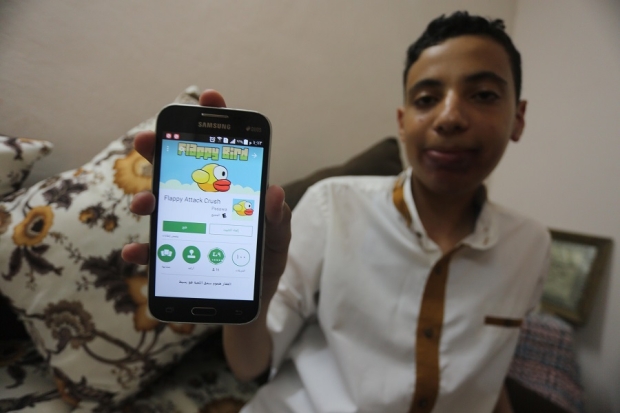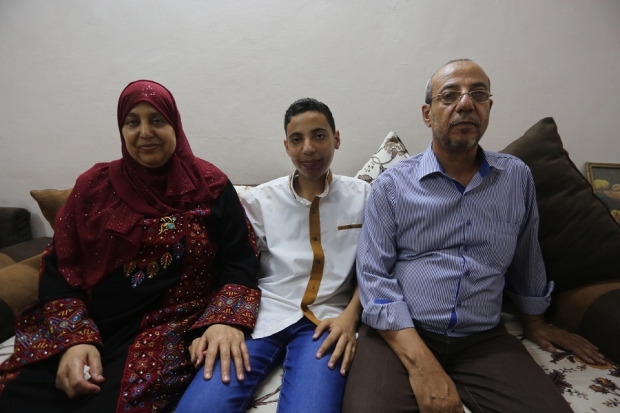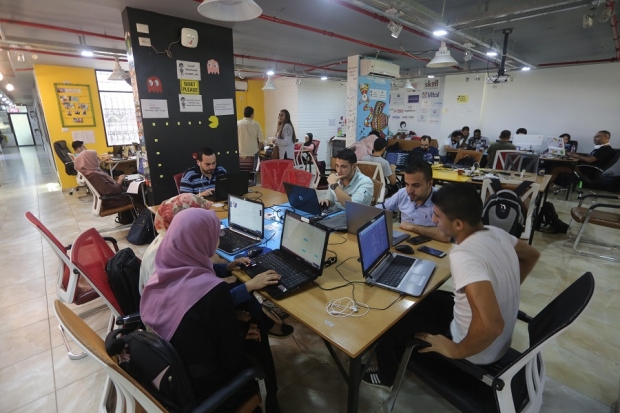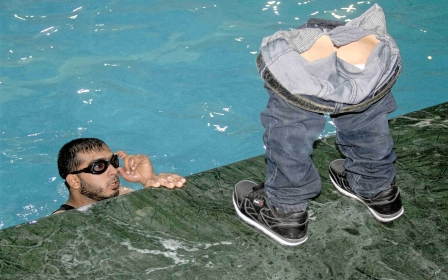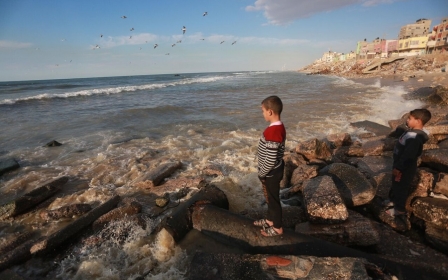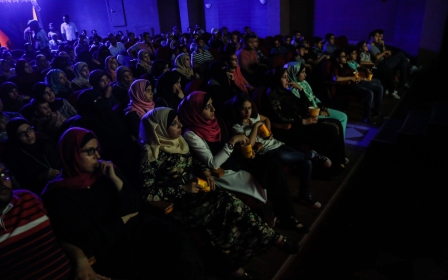Gaza teenager invents 20 games: The prodigy programmer dreams big
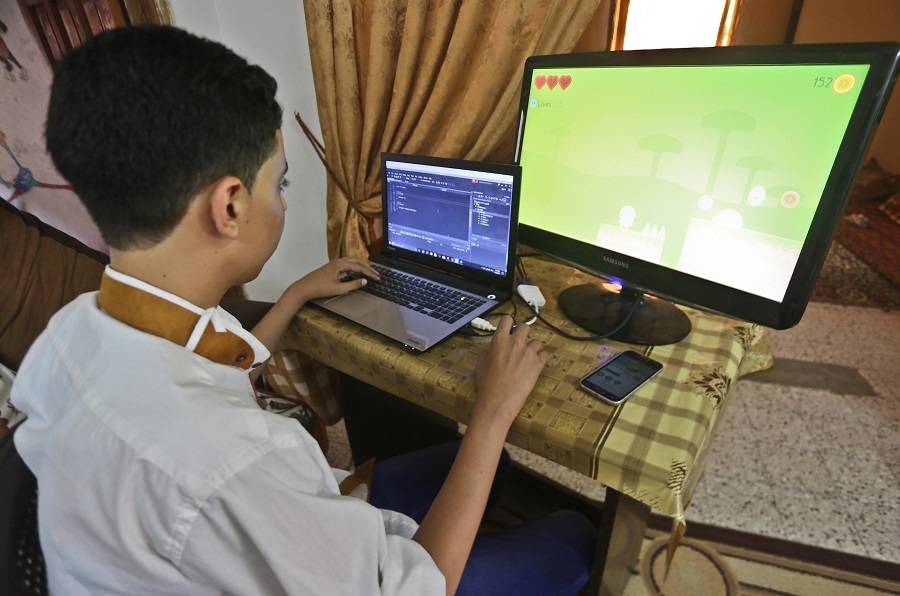
GAZA STRIP - For five years, the now 15-year-old Bilal Shahin has been glued to the computer in his home in the besieged Gaza Strip. His love of discovering what lies inside this fascinating machine has consumed much of his existence.
He used to spend hours playing computer games, intrigued by how they were produced to entertain millions across the globe.
No one helped me, or noticed me. I was on my own the whole time trying to learn every single detail about programming
- Bilal Shahin, student
“I was very curious to know how these games were made, which is why I started learning how to produce my own video games,” Bilal tells Middle East Eye.
When Bilal was only 11 years old, he started watching YouTube videos and skimming through articles online to learn how to produce and program his own video games.
“No one helped me, or noticed me. I was on my own the whole time trying to learn every single detail about programming,” he says proudly.
He began producing prototype games. He continued to adjust the structure of the games’ programming and make alterations using Microsoft's code editing suite Visual Studio until he was happy with the final product.
The game's aim is to prevent “pesky” birds from crossing through animated pipes by crushing them. Bilal was inspired by other games he played on Google Play and challenged himself to produce games similar to them.
To launch a game on Google Play, the contributor must provide proof of all the steps taken to produce the game in detail, as well as pay $30 online. Bilal's IT teacher, Tawfiq Afana, insisted on paying the fees to encourage his talented student to pursue his dreams.
Afana says that Bilal always pays attention in his class and talks about how much he loves programming.
"I help him because you can't always find an advanced passionate 15-year-old programmer," Afana said.
In 2016, Afana encouraged Bilal to take part in the Gaza Technological Competition in al-Shalihat area, on the coast of Gaza. He demonstrated all of his video games in the competition and won first place amongst all the participants.
"I'm so proud Bilal is my student, I'm sure there is a bright future waiting for him," he said.
I'm so proud Bilal is my student, I'm sure there is a bright future waiting for him
-Tawfiq Afana, teacher
Bilal is in the 11th grade at Al Taqwa school in Gaza, where he got a 4.0 Grade Point Average (GPA).
Bilal likes to get feedback and take advice from his friends on how to develop and improve his games.
“I love playing Flappy Attack Crush especially when there is no electricity; I tell everyone I know that my friend Bilal made this game," said Reslan al-Jaabari, Bilal's friend.
Number one supporters
“I see Bilal as a computer game maker in the future,” says 53-year-old Samiha Shahin, Bilal's mother.
Bilal grew up in a family with limited resources and is the youngest of four siblings.
His mother is a cancer patient and his father, 60-year old Arafa Shahin, has retired from working as the head of the maintenance department at the Islamic University in Gaza.
Despite the hard circumstances his family has to cope with, they are his number one supporters.
“I am so proud of my son Bilal, since childhood he has been stuck to the computer,” said Samiha.
I am so proud of my son Bilal, since childhood he has been stuck to the computer
- Samiha Shahin, mother
Bilal’s parents are supportive of him travelling abroad to study and further develop his skills. They hope that Bilal will have the opportunity to work one day in one of the largest and most successful computer gaming companies.
“There are a lot of obstacles in the Gaza Strip, but despite everything I’m sure that Bilal’s dreams are going to come true,” says Arafa.
The ongoing blockade, increasing restrictions on freedom of movement, accompanied by growing rates of unemployment - over 60 percent amongst youth in Gaza - means that most young people feel trapped and unable to pursue academic or career opportunities abroad.
Bilal hopes he will be able to secure a scholarship at the Massachusetts Institute of Technology (MIT) in the US. But if he cannot leave the strip due to the siege, he will resort to plan B and study medicine in Gaza while continuing to pursue computer programming as a hobby.
Becoming a doctor is the traditional route for those with high grades in Gaza, as there are more opportunities for gainful employment as a doctor rather than a computer programmer in the besieged strip.
“In Gaza, the computer programming and information technology study path is not developed or modern, all they teach is the basics of programming,” says Bilal.
Unplugged but unbowed
Bilal says that one of the main obstacles he has faced since he started computer programming are the power cuts.
Gaza has been suffering from an electricity crisis for several years but the situation deteriorated this year, leaving two million citizens in darkness for around 20 hours a day. The UN Office for the Coordination of Humanitarian Affairs has warned of a looming humanitarian disaster if the crisis continues.
Bilal was frustrated when he lost all of his work several times because of sudden power cuts, until his parents bought him a laptop.
“We bought him a laptop by paying in instalments, to try to overcome the electricity crisis and the effect it is having on his work,” says Samiha.
Bilal’s father also bought a generator for 1500 shekels ($425) to make it easier for Bilal to access the internet, but he can’t always use it because the fuel required to power the generator is very expensive.
Generation geek
Bilal usually visits Gaza Sky Geeks (GSG), the first "tech hub" in Gaza, to develop and improve his skills.
Most importantly, it has a generator which provides more hours of electricity and better quality internet to its visitors.
Launched in 2016, Baskalet is a startup incubated by Gaza Sky Geeks that has become one of the most notable mobile gaming startups in Gaza.
Baskalet has a small office in Gaza Sky Geeks with a staff of six developers and designers.
The founder of Baskalet, Mohammed al-Madhoun, and Bilal live in the same neighbourhood. Madhoun noticed Bilal’s programming skills and asked him to train at Baskalet as an intern.
“On Bilal’s first day of training, I recognised that that he is an advanced programmer,” says Madhoun.
Everyone was surprised how Bilal built these professional computer programming skills on his own. Madhoun says he always tries to challenge Bilal to develop his skills.
“I believe that Bilal has a very bright future waiting for him.”
This article is available in French on Middle East Eye French edition.
New MEE newsletter: Jerusalem Dispatch
Sign up to get the latest insights and analysis on Israel-Palestine, alongside Turkey Unpacked and other MEE newsletters
Middle East Eye delivers independent and unrivalled coverage and analysis of the Middle East, North Africa and beyond. To learn more about republishing this content and the associated fees, please fill out this form. More about MEE can be found here.


